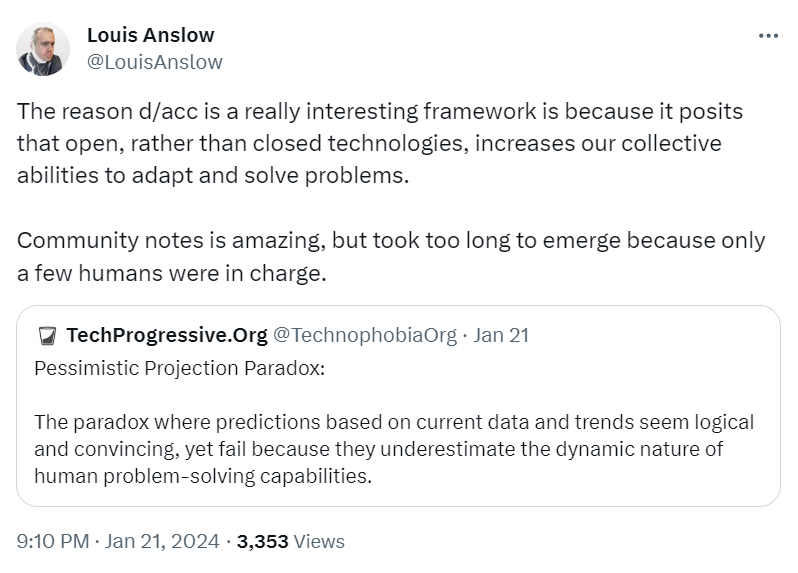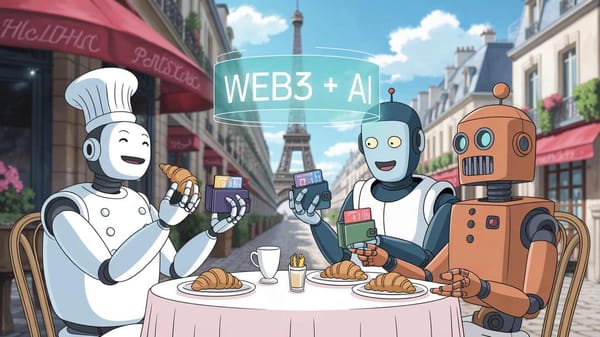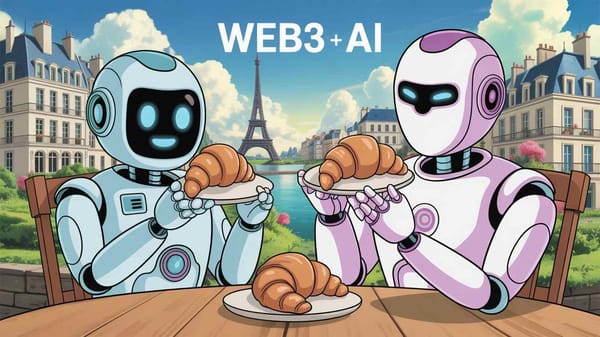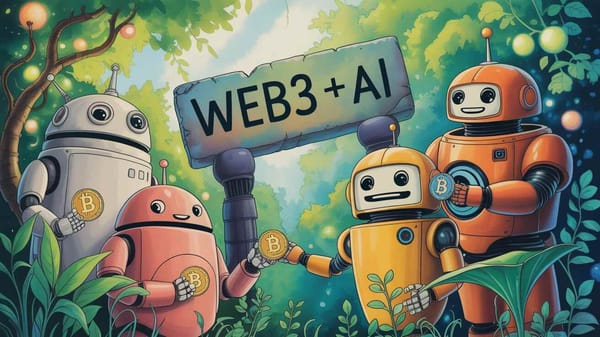e/acc, d/acc, bci/acc

Hello, everyone, and warm welcome to all newly joined subscribers!
This is the Analysis rubric of the Web3 + AI newsletter, where we discuss philosophy, ideological movements, and projects that push blockchain + artificial intelligence forward. Today's piece builds on the article Techno-Optimism and e/acc vs. d/acc I published back in November, and adds nuances to the ideas expressed there. It also introduces one more fork of the e/acc camp of thought.
Thank you for being here! Let's dive in!
Beff Jezos / Guillaume Verdon Talks e/acc with Lex Fridman
Back when I first wrote about e/acc or Effective Accelerationism, I mentioned the anonymous X accounts, Beff Jezos and Bayeslord - the proverbial leaders of the movement. I consequently drew your attention to Forbes exposing Beff's true identity without his consent and the first-ever interview he gave as Guillaume Verdon. Now, I am sharing Verdon's long-form conversation with Lex Fridman for its exhaustive exploration of numerous topics including thermodynamics, physics, quantum computing, doxxing, e/acc, and more. Though, I continue to use the Beff Jezos nickname, because that is the identity he chose for himself.
For most of 2023, the e/acc proponents were among the only voices defending and championing technological development, and AI progress in particular. Their constant ridicule and mockery of AI doomers and the ludicrous AI anthropomorphism are what attracted me to the movement. It is no surprise that the e/acc vs. decels opposition is at the heart of this Lex Fridman podcast episode as well.
Here again, Jezos exposes the sinister scenarios unfolding in AI exterminating humans as ungrounded and lacking scientific justification. However, he reaffirms the rather dire consequences of instilling such fears in society. First and foremost, they could result in missed growth opportunities, innovation, and wealth generation. Jezos considers that there is no middle path - we either build advanced AI technologies or cut them off and leave that whole untapped potential on the table. The alternative of accelerating progress is nothing else but stagnation, and scientific and technological deadlock may turn out to be much more dangerous than anything AI has to offer.
Jezos is convinced that it would be in humanity's self-interest to combine and augment ourselves with artificial intelligence, and that such a future will unlock unprecedented prosperity. He also argues that we owe it to future generations to take the path to progress.
Second, he argues that fueling public suspicion and pessimism toward AI ultimately aims to limit the proliferation of AI research and experimentation. If the power of AI is concentrated in the hands of very few, especially if these are governments and companies controlling the flow of information, we may find ourselves in quite a daunting and dystopian situation. Human history has shown that the centralization of excessive amounts of power always leads to dictatorship and suffering.
When asked about what e/acc is exactly, Jezos describes it as a viral optimistic movement, seeking to promote growth while leaning on the natural tendencies of the system to adapt to its changing environment. He asserts that the only way to ensure that malleability and adaptability are maintained is through supporting a healthy competition of ideas, opinions, and business ventures. That is why the e/acc fans are generally set against any form of constraint or overregulation. That is also why Verdon values the option of remaining anonymous and denounces Forbes for doxxing him.
Ever since I started following Jezos, I have noticed one major cognitive dissonance in his reasoning, and I am glad Lex Fridman asked him about it: Elon Musk. Jezos praises Musk for “bringing freedom of speech back to X” after acquiring the company. He also touts Musk's approach to dealing with some of humanity's major problems like climate change through profitable and self-sustaining innovation, and not via degrowth. However, over the last year, Musk has been one of the loudest AI doomers and has consistently urged for regulating and “pausing” AI development because of the “risks to society” it brings. Jezos, slightly naively, commented that Musk's xAI is just another example of a free market booster - a free market of reliable AIs. However, he expressed his disagreement with Musk's negative stance on the open-source AI ecosystem.
Finally, when inquired about EA (Effective Altruism), Jezos noted that the organization had acquired enormous amounts of capital and power, and that, “unfortunately, sometimes, that corrupts people over time”.
Listen to the full recording below and let me know your thoughts.
Vitalik Buterin Breaks d/acc Down For Bankless
I highlighted Beff Jezos's opinions and the e/acc philosophy as a whole, mainly because they were the trigger for Vitalik Buterin to come up with d/acc, aptly comprising the core values that should push the crypto space forward. The Ethereum leader also aims to position blockchain technology within this broader societal conversation on AI's potential impact and to demonstrate its democratizing effects.
As I said before, d/acc is a more moderate view of accelerating technological progress that emphasizes protecting decentralization and defense mechanisms. That is especially evident in this Bankless podcast conversation, where Buterin dissects his thought process and inspirations.
What Buterin says, in short, and I agree, is that there is no real difference between accelerationists and degrwothers, e/acc and EA (Effective Altruism). To the wide audience, they are more or less the same tribe - San-Francisco-based, rich male tech geeks, running in the same social circles. However, both camps put loads of money and effort into influencing governments, so it is worth paying attention to the causes they advance. Yet, there is no point in embracing either one of these ideologies. Rather, we should choose different components of various schools of thought that work for us, and that is what d/acc does.
Accordingly, Buterin praises e/acc for its optimism about tech and the hope it instills in tech builders. On the contrary, he is not sympathetic to the anti-tech moods and claims that technological solutions are quickly invented when massive societal issues emerge. When asked about EA (Effective Altruism), an organization with which he was also affiliated, he slashes its inadequacy in handling the last cases its name was involved in, namely the FTX collapse and OpenAI removing Sam Altman as CEO.
Furthermore, Buterin shares some widespread fears of a superintelligent AI, determining the pdoom (probability of doom) at 10%. However, he gives several anti-doom arguments too. For instance, he considers that the kinds of AIs we currently have are not goal seekers and don't act like they maximize any particular objective. Also, the level of harm from deepfakes so far has been surprisingly lower than societal expectations.
Buterin's biggest concern vis-à-vis AI is whether it will turn out to be the ultimate centralizing power, but that is exactly where blockchain comes in to counteract. He determines that the crypto space's mission is to improve the baseline defensiveness of the world while at the same time allowing it to remain pluralistic. The way to achieve that is through accelerating the decentralized perspective on trusts and technologies like cryptography and zero-knowledge proofs.

I must say, I am a huge fan of these views on resilience through collective action and open, democratic, fairly incentivized coordination. It is no wonder my passion for crypto has only intensified over the years.
Ocean Protocol's Trent McConaghy and bci/acc
A few days ago, another fork of the e/acc doctrine was published, and since it once again comes from a representative of the Web3 industry, I decided to share it with you. Ocean Protocol's Trent McConaghy has extensive expertise in both crypto and AI, and has been reflecting and working on the convergence of blockchain, data, and artificial intelligence for years.
Now, he offers bci/acc - a theory suggesting that the only way for humanity to handle ASI (Artificial superintelligence) risks is to accelerate the development of brain-computer interface (BCI) technologies. However, his strategy doesn't involve countering or stopping ASI. Rather, he supposes that through the use and mass adoption of BCI devices, humans will achieve superintelligence and will be able to compete with ASI.
I was expecting that blockchain would occupy a more significant place in McConaghy's bci/acc theory, but he barely mentions it. He confirms his disbelief that ASI could be unplugged:
The ASI is smart, so it’s already made itself decentralized, therefore sovereign, therefore un-unpluggable. Just like Bitcoin.
Or that cryptography or blockchain could be employed to stop ASI:
The idea is to use advances in cryptography, blockchain, and more to make the cage “hack proof”. Sergey Nazarov of Chainlink is a proponent, among others. The problem: humans are the weak link in computer systems.
Fortunately, he envisions Web3 products being used at least for data management:
A Web3 framing is: “Your keys, your thoughts. Not your keys, not your thoughts”. Web3 points to a potential starting-point too: you hold your keys to your data. And use infrastructure like like Arweave to store your brain data, and Ocean Protocol to manage your brain data.
I perceive McConaghy as a bit too optimistic about the speed of development of AGI and ASI, leaning too much towards sci-fi. His current assumption is that ASI, meaning AI “that can do all tasks at a level far exceeding any human”, will become a reality in 3 to 10 years. What is more, he has been an amplifier of the “existential threat of AI” narrative, with which I generally don't agree. However, I believe in the importance of pluralism and in sharing opinions I may not necessarily like. Maybe bci/acc is indeed the future, or at least one of the possible futures.

Disclaimer: None of this should or could be considered financial advice. You should not take my words for granted, rather, do your own research (DYOR) and share your thoughts to create a fruitful discussion.





